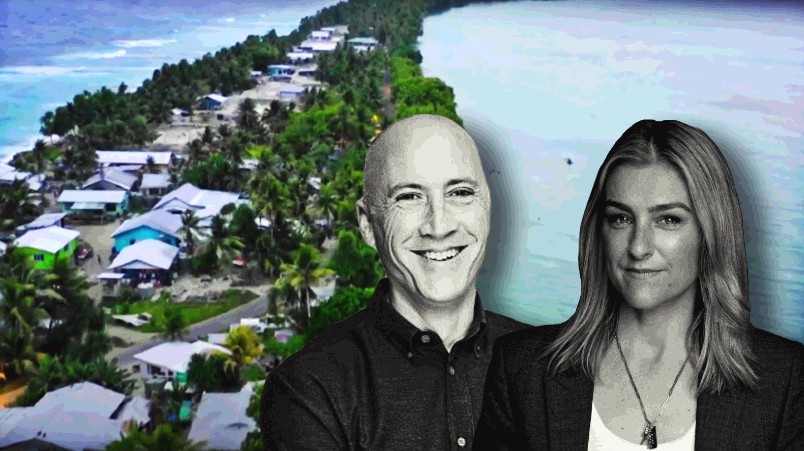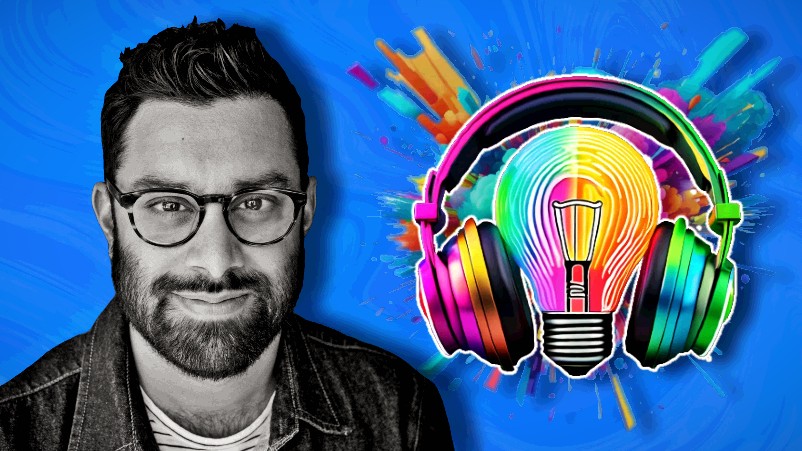Awareness up, action down: Monkeys land top Cannes gong for tiny, sinking nation; Tuvalu MP says awareness soars from metaverse project but climate action falling short, Pacific island remains in peril

The Monkey's Group CEO Mark Green and chief creative officer Tara Ford helped Tuvalu raise awareness about its looming climate catastrophe through an award-winning campaign
The Monkeys, part of Accenture Song, has cemented its reputation in global adland folklore by winning the coveted Daniel Wieden Titanium Grand Prix at Cannes. Working alongside the Tuvalu Government and the agencies Collider and Thrive PR, the campaign creates Tuvalu in the metaverse and uploads historical records and cultural material onto the cloud to preserve the nation's statehood in the digital realm when the islands are eventually swamped by rising sea water, a fate predicted to be only decades away. Meanwhile, Australia finished among the Top 10 countries on the Cannes medal table and New Zealand enjoyed its own success.
What you need to know:
- The Monkeys, part of Accenture Song, has won the most prestigious award at Cannes, scooping a Titanium Grand Prix.
- The campaign created digital islands on the metaverse and stored official and historical records on the cloud to create the world's First Digital Nation.
- The Monkeys, Collider and Thrive PR worked with the Tuvalu Government on the campaign.
- The campaign was launched at COP 27 last year and its metrics are impressive, reaching more than 2 billion people and nine nations to recognise the digital Tuvalu as a sovereign nation.
- However, the Tuvaluan MP who fronted the campaign says although awareness has soared, climate action is falling well short and his nation remains in peril.
- Other Aussie and Kiwi work also picked up impressive awards at Cannes, including Gold Lions winner Special.
If we were to measure it in terms of climate action, and [greater awareness] actually translating to concrete action from big countries, I think we fall short of that...we're still looking at a worst-case scenario for Tuvalu.
The Monkeys creation of a “digital nation” under threat from rising sea levels won one of adland’s top industry awards, the Cannes Lions Festival of Creativity Titanium Grand Prix.
Several other Australian and Kiwi agencies picked up silverware, including a strong showing by the NZ agency Special (see below).
The star of the show – at least from an Aussie and Pacific Islands point of view – was The Monkeys, Part of Accenture Song’s creative work to raise awareness about the plight of Tuvalu, a small Polynesian archipelago of nine islands and 12,000 people that could be swamped within decades if sea levels continue to rise at current rates.
Tuvalu is the world’s least populated UN member state and the third smallest by land mass, trailing only Monaco and Nauru. But it is the archipelago’s lack of height – an average of 2m above sea level – that threatens its existence. The impacts of climate change and rising sea water not only threaten to one day submerge land, but also create more frequent and weather events and storm surges, contaminate underground freshwater and threaten energy and food security; the majority of food in Tulavu is imported.
The Tuvalu government has lobbied the UN for years to do more to tackle climate change, and last year called upon The Monkeys to hatch a plan to raise awareness and enable the nation to survive if its landmass is lost to the ocean. The Monkeys carried out the work in partnership with Collider and Thrive PR.
The campaign created digital versions of the islands in the metaverse and uploaded important historical, cultural and governmental records on the cloud to establish “The First Digital Nation” and safeguard its heritage indefinitely.
The campaign video (see above) features Minister of Justice, Communications and Foreign Affairs of Tuvalu Simon Kofe delivering a speech from a virtual island of Tuvalu to the UN’s Climate Change Conference (COP27), in which he stressed the urgency of the world to take action before his people are forced to move away from the physical and into the digital realm.
It reached an estimated 2.1 billion people.
Islanders strike again, but will campaign prove effective?
The last Australian entry to win the coveted Titanium Grand Prix was Host/Havas with its work on the Palau Pledge to encourage responsible tourism. This 2018 campaign created a policy that has since been enshrined in Palauan law, with the idea spreading to other countries, including New Zealand and Hawaii.
In Tuvalu’s case, the campaign has enjoyed some initial success, particularly in raising awareness about the issue and becoming recognised as a sovereign “digital” nation by nine other countries, but Kofe recently told the Harvard International Review that the broader objective, which includes ongoing lobbying efforts, had failed to deliver the international climate change action required to keep sea level rises at bay.
“[A] part of our objective (was) to raise awareness, not just for leaders, but for the wider public, so people that are aware that climate change is an issue that affects everyone, and also particularly our future generations. So, I guess in that regard, it's successful; we've reached a wider audience,” he said.
“But if we were to measure it in terms of climate action, and [greater awareness] actually translating to concrete action from big countries, I think we fall short of that. Countries have been making some positive steps, but scientists are saying that [we] still fall short of the targets that we've set up for ourselves. And we're still looking at a worst-case scenario for Tuvalu.”
Scientists predict that on current trends, Tuvalu will be uninhabitable and lost to the ocean between 50 to 100 years unless drastic action is taken.
The country has established the Future Now Project in the event of the worst case scenario. This three-pronged plan aims to preserve Tuvalu's nationhood, governance and culture by working with other nations to encourage global climate action; securing its statehood and maritime boundaries under international law; and developing a 'digital nation' that will allow it to function similarly to a government in exile through the use of cloud, VR and AR technology.
How this will play out in the New York halls of the UN HQ, rather than Cannes' Palais des Festivals remains to be seen, but technology like the metaverse at least allows Tuvaluan culture, records and history to be preserved in the cloud.
“The metaverse is also an important part of that because the metaverse is a platform that we feel would best communicate our culture to future generations and to anyone who wants to learn more about Tuvalu,” Kofe told the Harvard International Review. “We feel that the metaverse provides an immersive experience for people, and building a virtual copy of Tuvalu not only preserves our culture, it improves accessibility.”
Tuvalu has been fighting climate change for over 30 years. Without land, you don’t have a nation. You don’t have a place on the world’s stage. Our mission was to help them protect their sovereignty even when the land has gone. We are honoured to receive this very special award.
Why Titanium Lions matter
Winning a Titanium Grand Prix is no mean feat. It is the most prestigious prize recognising work at Cannes, and in the category only three other Titanium Lions were handed out. The Monkeys is only the second Australian entry to ever receive the accolade.
The Titanium Lions, renamed to Dan Wieden Titanium Lions in memory of the Wieden+Kennedy co-founder who passed away last year, recognise ground-breaking and proactive work.
Titanium Lions jury president and Accenture Song Global CEO David Droga said: “This is far more than a creative or tech idea. It’s not even about a disposable execution. It is about recognition, policy and safeguarding GDP.
“It is also about creating new precedents for dozens of other countries facing a similar future. This work was the highest scored entry from day one of the prejudging, to the very last vote on the Grand Prix on the final day. It is an idea that needed to happen and should live on far beyond any of us.”
The Monkeys Chief Creative Office Tara Ford added: “Tuvalu has been fighting climate change for over 30 years. Without land, you don’t have a nation. You don’t have a place on the world’s stage. Our mission was to help them protect their sovereignty even when the land has gone. We are honoured to receive this very special award."
Aussie & Kiwi success
The Monkeys were not the only local agencies to shine on the French Riviera this year. In total, Australia bagged 29 Lions, which placed the nation seventh overall. The three biggest winners were the US (218 Lions), the UK (84) and Brazil (84).
Special New Zealand took out the Independent Agency of the Year – Strategy award, and Howatson+Company Sydney snared the Independent Agency of the Year – Good award.
CHEP Network Sydney won a Grand Prix in the Social & Influencer Lion category for its work on Samsung’s Flipvertising campaign. AKQA Australia was awarded a Grand Prix for Digital Craft for Nike’s Never Done Evolving (see above) and a Gold Lion for Congresso’s em Foco’s Transparency card.
Special collected two Gold Lions in Creative Strategy and Media for Partners Life campaign The Last Performance, and Dig copywriters Casey Clarke and Zac Nairnat won Gold for Digital for Little Learners League.


